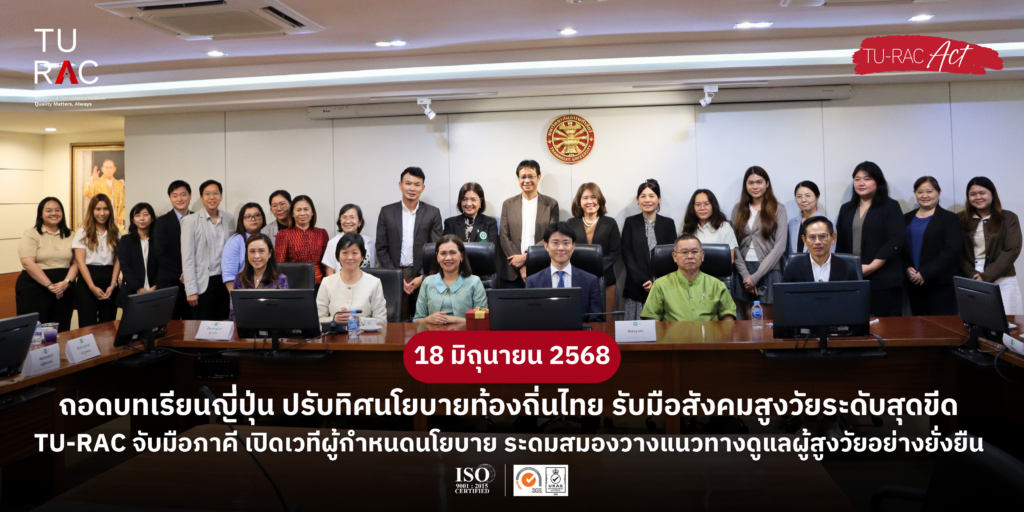18 มิถุนายน 2568 ณ ห้องประชุมประกอบ หุตะสิงห์ มหาวิทยาลัยธรรมศาสตร์ ท่าพระจันทร์ สถาบันวิจัยและให้คำปรึกษาแห่งมหาวิทยาลัยธรรมศาสตร์ (TU-RAC) ร่วมกับศูนย์พัฒนาธุรกิจและการดูแลสังคมสูงอายุ (ABCE Centre) คณะพาณิชยศาสตร์และการบัญชี มธ. และวิทยาลัยสหวิทยาการ มธ. จัดประชุมผู้กำหนดนโยบาย (Round Table Meeting) ภายใต้หัวข้อ “ปรับทิศท้องถิ่นไทยกับการดูแลสุขภาพผู้สูงอายุ : ภาพสะท้อนจากญี่ปุ่น” คับคั่งด้วยผู้แทนจากหน่วยงานภาครัฐกว่า 30 คนร่วมระดมความคิดและถ่ายทอดประสบการณ์จริงจากการดำเนินงาน โดยมี กรมกิจการผู้สูงอายุ กรมการแพทย์ กรุงเทพมหานคร สำนักงานการวิจัยแห่งชาติ (วช.) สำนักงานสภานโยบายการอุดมศึกษา วิทยาศาสตร์ วิจัยและนวัตกรรมแห่งชาติ (สอวช.) สำนักงานคณะกรรมการส่งเสริมวิทยาศาสตร์ วิจัยและนวัตกรรม (สกสว.)
สมาคมสันนิบาตเทศบาลแห่งประเทศไทย สำนักงานบริหารและพัฒนาองค์ความรู้(OKMD) มูลนิธิเสริมสร้างวิถีบริโภคอาหารเพื่อสุขภาพ และองค์การความร่วมมือระหว่างประเทศของญี่ปุ่น (JICA) โดยการประชุมมุ่งเน้นการแลกเปลี่ยนแนวคิดและแนวทางเชิงปฏิบัติเพื่อยกระดับการดูแลผู้สูงอายุของไทย ซึ่งได้รับเกียรติจาก Mr. Naoyuki Wada, Financial Attaché จากสถานเอกอัครราชทูตญี่ปุ่นประจำประเทศไทย ร่วมถ่ายทอดบทเรียนจากประสบการณ์จริงของญี่ปุ่นในการจัดระบบดูแลผู้สูงอายุ โดยเฉพาะ “ระบบประกันสุขภาพระยะพักฟื้น (Kaigo Hoken)” ที่เน้นบทบาทองค์กรปกครองท้องถิ่นในการส่งมอบบริการสาธารณสุขที่เข้าถึงได้อย่างแท้จริง
จากสถานการณ์ของประเทศไทยที่กำลังก้าวเข้าสู่สังคมสูงวัยระดับสุดขีดอย่างรวดเร็ว โดยผู้สูงอายุจะมีสัดส่วนกว่า 28% ของประชากรทั้งหมดในปี 2576 ในขณะที่อัตราการเกิดลดต่ำลง ส่งผลต่อโครงสร้างแรงงานและภาระทางเศรษฐกิจอย่างหลีกเลี่ยงไม่ได้ แนวคิดการดูแลสุขภาพผู้สูงอายุแบบองค์รวม ตั้งแต่การป้องกัน (Preventive Care) การดูแลระยะกลาง (Intermediate Care) จนถึงการดูแลระยะยาว (Long-Term Care) ควบคู่กับการออกแบบนโยบายการเงินการคลังและกลไกชุมชนให้สอดรับกับบริบทของท้องถิ่น จึงเป็นสิ่งสำคัญที่ภาครัฐและทุกภาคส่วนควรเร่งปูทางสู่การสร้างข้อเสนอเชิงนโยบายที่นำไปสู่การพัฒนาโมเดล และนวัตกรรมใหม่สำหรับการดูแลผู้สูงอายุของประเทศไทยอย่างยั่งยืน พร้อมทั้งการเปิดโอกาสให้ภาคธุรกิจร่วมสร้างภูมิทัศน์ทางสังคม เศรษฐกิจ และบริการที่ตอบสนองต่อความต้องการของผู้สูงอายุอย่างมีคุณภาพและหลากหลาย ทั้งในด้านสุขภาพ ที่อยู่อาศัย เทคโนโลยีช่วยดูแล และกิจกรรมส่งเสริมสุขภาวะ
จากการถอดบทเรียนของประเทศญี่ปุ่น ผู้เข้าร่วมประชุมต่างเห็นพ้องว่า การรับมือกับสังคมสูงวัยระดับสุดขีดต้องไม่ใช่เพียงการดูแลเชิงสังคมสงเคราะห์ แต่ต้องเป็นการออกแบบโครงสร้างใหม่ที่หลอมรวมทั้ง “นโยบาย-งบประมาณ-นวัตกรรม” ไว้อย่างเป็นเอกภาพ เพื่อสร้างระบบดูแลผู้สูงอายุที่มั่นคง ครอบคลุม และยั่งยืน
การประชุมครั้งนี้ถือเป็นอีกหนึ่งหมุดหมายสำคัญของการผลักดันประเด็น “การสูงวัยอย่างมีคุณภาพ” ให้เป็นวาระแห่งชาติ พร้อมจุดประกายการปฏิรูประบบดูแลผู้สูงอายุไทยอย่างจริงจัง และเชื่อมโยงแนวทางที่ประสบความสำเร็จในต่างประเทศมาสู่การปรับใช้ในบริบทไทยอย่างเป็นรูปธรรม
________________________________________________________________
Learning from Japan: Realigning Local Policies in Thailand to Tackle a Super-Aged Society
TU-RAC and Partners Host Policy Roundtable to Develop Sustainable Elderly Care Strategies
On June 18, 2025, at the Prakob Hutasingh Meeting Room, Thammasat University, Tha Prachan Campus, the Thammasat University Research and Consultancy Institute (TU-RAC), in collaboration with the Aging Business and Care Economy Centre (ABCE Centre) of the Faculty of Commerce and Accountancy and the School of Interdisciplinary Studies, organized a high-level Round Table Meeting on the theme: “Realigning Thailand’s Local Approach to Elderly Healthcare: Reflections from Japan.”
The event brought together over 30 representatives from government agencies and partner organizations to exchange ideas and share practical experiences. Participants included the Department of Older Persons, Department of Medical Services, Bangkok Metropolitan Administration, National Research Council of Thailand (NRCT), Office of the National Higher Education, Science, Research and Innovation Policy Council (NXPO), Thailand Science Research and Innovation (TSRI), the Municipal League of Thailand, Office of Knowledge Management and Development (OKMD), Foundation for Consumers, and the Japan International Cooperation Agency (JICA).
The meeting focused on collaborative dialogue and practical approaches to enhance Thailand’s elderly care systems. It featured a special address by Mr. Naoyuki Wada, Financial Attaché from the Embassy of Japan in Thailand, who shared Japan’s practical experience in designing and implementing elderly care systems—particularly the Kaigo Hoken long-term care insurance model, which emphasizes the role of local governments in delivering accessible and inclusive healthcare services.
As Thailand rapidly transitions into a super-aged society—where the proportion of elderly citizens is expected to exceed 28% by 2033—declining birth rates and a shrinking labor force are creating significant economic and social pressures. In response, the meeting emphasized the importance of adopting a comprehensive approach to elderly care, including preventive care, intermediate care, and long-term care, alongside the development of fiscal policies and community-based mechanisms that align with local realities.
Participants agreed that these efforts must go beyond basic welfare and instead require a redesign of systems that seamlessly integrate policy, budgeting, and innovation into a unified framework. This will support the creation of a robust, inclusive, and sustainable elderly care infrastructure.
The meeting also encouraged the private sector to contribute to reshaping the social and economic landscape to better serve an aging population—through quality services in health, housing, assistive technologies, and wellness programs.
By drawing lessons from Japan’s experience, participants reinforced that addressing the challenges of a super-aged society must involve structural transformation. The insights gained are expected to inform the development of practical policy proposals, new care models, and innovations tailored to the Thai context.
This Round Table Meeting represents a critical milestone in advancing the national agenda of “Active and Quality Aging,” and serves as a catalyst for systemic reform in elderly care—bridging global best practices with local policy implementation in a tangible, impactful manner.



